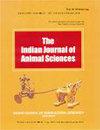Effect of Zinc supplementation on haematology, oxidative stress and plasma biochemical parameters in cadmium exposed goats
IF 0.3
4区 农林科学
Q4 AGRICULTURE, DAIRY & ANIMAL SCIENCE
引用次数: 0
Abstract
The present study was designed to assess the effect of zinc supplementation on haematology, oxidative stress and plasma biochemical parameters in Cd induced lactating goats. Eighteen crossbred lactating goats were divided into three groups (Control, T1 and T2). In T1 and T2 groups, goats were given 10 ppm Cdcl2, while in T2, Zinc @100ppm was also supplemented for period of 120 days. At the end of study, blood glucose, TLC, neutrophil % and AST, ALT were increased significantly in T1 group and except glucose, Zn supplementation in T2 group showed its protective effect on TLC, neutrophil %, lymphocyte %, AST and ALT. There was significant decrease in lymphocyte %, Hb and plasma total antioxidant activity in T1 group. At 30 days, the activity of SOD was increased in T1 and T2 but thereafter activities were significantly decreased at 120 days in T1 but in T2 it was similar to control. The activity of catalase was increased on 30 and 60 days and thereafter decreased from 90 days onwards but the rate of decline was comparatively less in T2. Total immunoglobulin and lymphocyte stimulation index were significantly decreased in T1 group whereas in Zn supplemented group decline trend was less. Henceforth, it was concluded that 100 ppm Zn is helpful in reducing burden of Cd induced biochemical and oxidative stress in goats.补锌对镉暴露山羊血液学、氧化应激及血浆生化指标的影响
本试验旨在研究锌对镉诱导的泌乳山羊血液学、氧化应激和血浆生化指标的影响。将18只杂交泌乳山羊分为对照组、T1组和T2组。T1组和T2组分别饲喂10 ppm的Cdcl2, T2组同时补充100ppm的锌,试验期120 d。研究结束时,T1组血糖、TLC、中性粒细胞%、AST、ALT均显著升高,T2组除补充葡萄糖外,锌对TLC、中性粒细胞%、淋巴细胞%、AST、ALT均有保护作用,T1组淋巴细胞%、Hb、血浆总抗氧化活性均显著降低。30 d时,SOD活性在T1和T2均有所升高,但此后在120 d时活性显著降低,但在T2时与对照相似。过氧化氢酶活性在第30、60天呈上升趋势,90天以后呈下降趋势,但在T2时下降幅度相对较小。T1组总免疫球蛋白和淋巴细胞刺激指数显著降低,而补锌组下降趋势较小。综上所述,100 ppm Zn有助于减轻山羊Cd诱导的生化应激和氧化应激负担。
本文章由计算机程序翻译,如有差异,请以英文原文为准。
求助全文
约1分钟内获得全文
求助全文
来源期刊

Indian Journal of Animal Sciences
农林科学-奶制品与动物科学
CiteScore
0.60
自引率
25.00%
发文量
220
审稿时长
8 months
期刊介绍:
Articles published in The Indian Journal of Animal Sciences encompass a broad range of research topics in animal health and production related to cattle, buffalo, sheep, goat, camel, equines, pig, rabbit, yak, mithun, poultry and fisheries. Studies involving wildlife species and laboratory animal species that address fundamental questions about their biology will also be considered for publication. All manuscripts must present some new development and must be original, timely, significant and scientifically excellent. Papers will be rejected if standards of care of, or procedures performed on animals are not up to those expected of humane veterinary scientists. At a minimum, standards must meet the International Guiding Principles for Biomedical Research involving Animals, as issued by the Council for International Organizations of Medical Sciences. (C.I.O.M.S., c/o WHO, CH 1211 Geneva 27, Switzerland). Articles reporting new animal disease must follow GOI directive as given in detail in Guidelines to Authors.
 求助内容:
求助内容: 应助结果提醒方式:
应助结果提醒方式:


